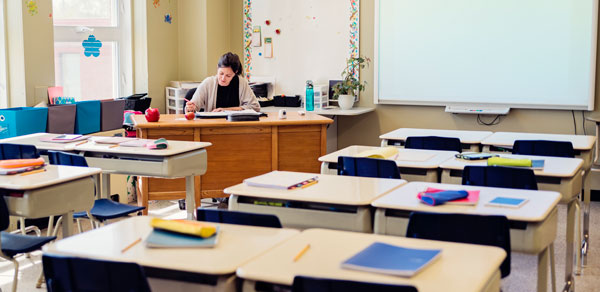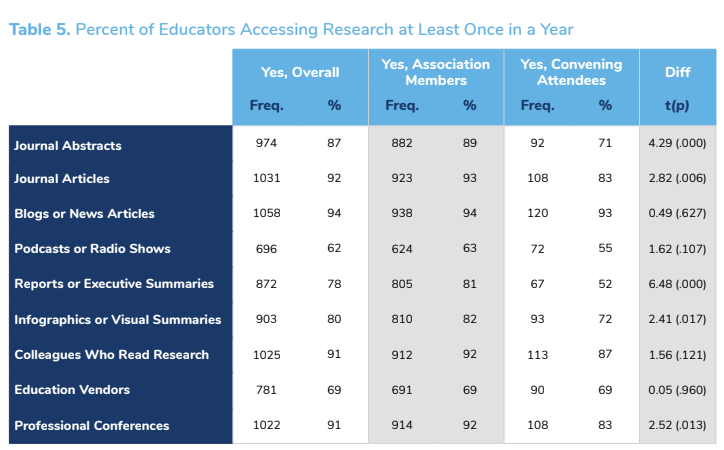Teachers Say They’re Consuming Research. Putting It to Use Is Another Story

More than nine out of 10 teachers say they seek out academic research from journal articles at least once a year, although they are ambivalent at best about the timeliness of that material, whether it’s decipherable, and their ability to apply it to their work, a new survey finds.
The results were published in a report, “Educator Voices on Education Research,” by the Jefferson Education Exchange, a nonprofit backed by the University of Virginia’s Curry School of Education and Human Development and the Strada Education Network, an organization focused on education and employment.
The exchange has conducted research exploring ways to make research useful and relevant to K-12 education, and the barriers that keep schools from putting it to use.
“Educators are accessing research, but they don’t always use that research to directly inform their practices,” said Emily Barton, a research assistant professor at the Curry School, who is also director of implementation research at the exchange.
One of the standards for judging academic work focused on K-12 schools, she said in an interview, should be that scholars are “doing the research educators need.”
The online survey was given to 1,334 educators from all 50 states and the District of Columbia. The exchange had distributed the survey at meetings it staged last year among educators, with the help of a group of 64 education-focused associations, who came together to discuss how academic research could better reflect schools’ practical needs.
Those associations were an eclectic assortment that included the International Society for Technology in Education; the National Council of Teachers of Mathematics; two major unions, the National Education Association and the American Federation of Teachers; and the International Dyslexia Association, among others.

The survey is not nationally representative, and the makeup of the pool of teachers surveyed could skew toward those who are relatively research-savvy. But the results nonetheless offer insights to higher education officials, funders, and K-12 officials trying to make sense of why academic research is often of little use to educators, said Bart Epstein, the CEO of the Jefferson Education Exchange.
The gap between academia and K-12 schools was driven home by a second, follow-up survey of 157 educators, also conducted by the exchange. It found that just 16 percent of teachers said they use research to inform their practices.
The findings have implications for K-12 companies, many of whom invest in conducting research of varying degrees of rigor on their products. Some vendors invest in achieving positive research results. But they’re often unclear on whether teachers, and administrators making decisions about buying products, are paying attention to that evidence, or more inclined to select products and services based on other factors, such as word-of-mouth recommendations from peers.
A Fear of ‘Overselling’
The educators who responded to the JEX survey have worked in education for an average of 21 years. The majority of them teach in public schools. Science, arts, and math educators were strongly represented in the survey. Fifty-nine percent of the educators who responded to the survey have master’s degrees.
Among the report’s findings:
- Overwhelming majorities of educators say they access research at least once a year, in some cases from secondhand sources. They look at research in the form of academic journal articles (92 percent); colleagues who have read the research (91 percent); blogs/news articles (94 percent); and conferences (91 percent). A much smaller proportion, 69 percent, said they consult research provided by education vendors.
- Teachers were not big believers in the usefulness of research to their work. Asked on a scale of 1-7 to say whether they agreed or disagreed with various statements, with 7 being “strongly agree,” relatively few teachers said that research was easy to find (4.57). Educators also had mixed views on whether research was easy to understand (4.54), timely (4.87), and easy to transfer to their practice (4.47). Teachers were more optimistic about research’s usefulness to guide their practice (5.49).
- Educators are especially hungry for research that spells out connections to what they do. A relatively high proportion of educators, 5.80 on the 7 scale, said that research “accompanied with clear, explicit directions” is useful.
- The biggest share of educators say they access research through internet searches (68 percent). Other popular gateways were through professional associations (58 percent) and social media (47 percent.)
One of the reasons academic research is disconnected from classroom practice is that there aren’t strong incentives in the postsecondary world, or anywhere else, to close that gap, said Epstein.
Currently, too much academic research is conceived without significant input from educators, and when it’s published it floats “into the ether,” he said. It’s up to teachers to try to do the heavy lifting and figure out how to make academic work relevant to trying to improve the teaching and learning.
Ideally, the value of academic research would be judged on metrics such as the number of teachers who end up changing their instructional practices based on it, said Epstein.
“Right now, there’s not a good mechanism for that to happen,” he said.
There are also longstanding norms and customs that stand in the way of turning academic research into practice, said Barton. One is that academic researchers are generally reluctant to step outside of their research in a way that comes across as advocacy, or “overselling” a finding, she said.
Classroom teachers, by contrast, might love it if they did more of that.
“Educators want the next step [in using] the research,” Barton said. “Educators would like us to give clear direction that aligns with their context.”
Follow EdWeek Market Brief on Twitter @EdMarketBrief or connect with us on LinkedIn.
See also:

Classroom teachers, by contrast, might love it if they did more of that.
The education nonprofit Digital Promise actually has a free web app that translates Pk-HS learning science research into actionable strategies for classroom teachers to use with resources and references. They take a whole child perspective and the content has been vetted by top researchers from around the country. Check it out! Learner Variability Navigator: https://lvp.digitalpromiseglobal.org/
I retired after 35 years of teaching partly because the three school systems I worked in had administrators who determined curricula and learning did not consult research or gave it lip service at best. I am very concerned about the amount of academic rigor being pushed in elementary schools that does not allow for students to see learning as fun or relevant to them. Students’ developmental levels are pushed aside as a result of making students “college ready.” I am not at all surprised that some assessment scores are dropping across the country. Students are turning off to school because they see learning as hard work every minute of every day. In my view, their brains are saturated. We need to look at the processes of how children learn much more than the current focus on what is learned.
Students have the greatest stake in their education but little to no say in how it is delivered.
Thank you Sir, for this info plzz keep share with us
thanks for this post it has great valuble content….
Hehe, thanks for this blog. Really informative.
You have great article and thanks for share